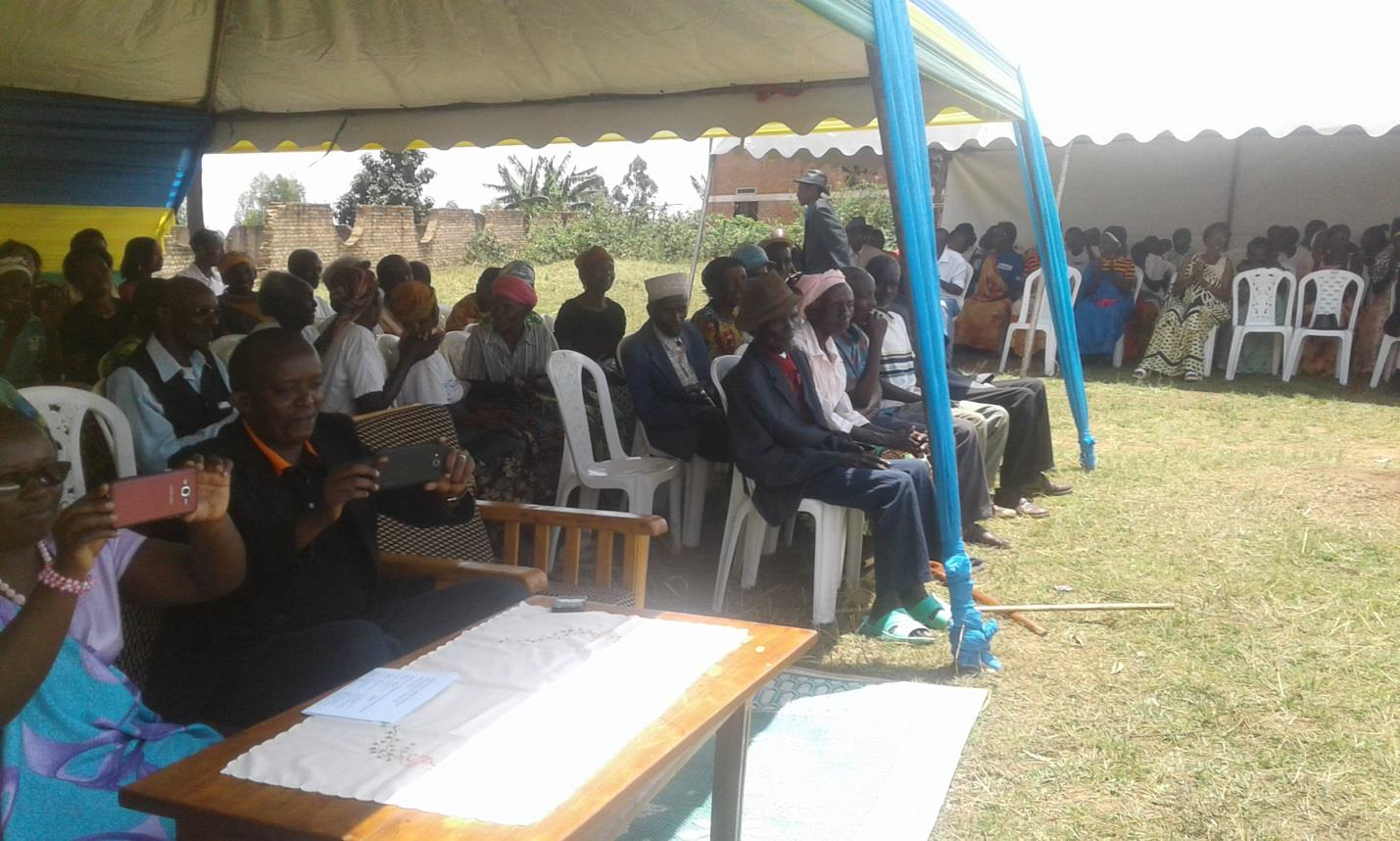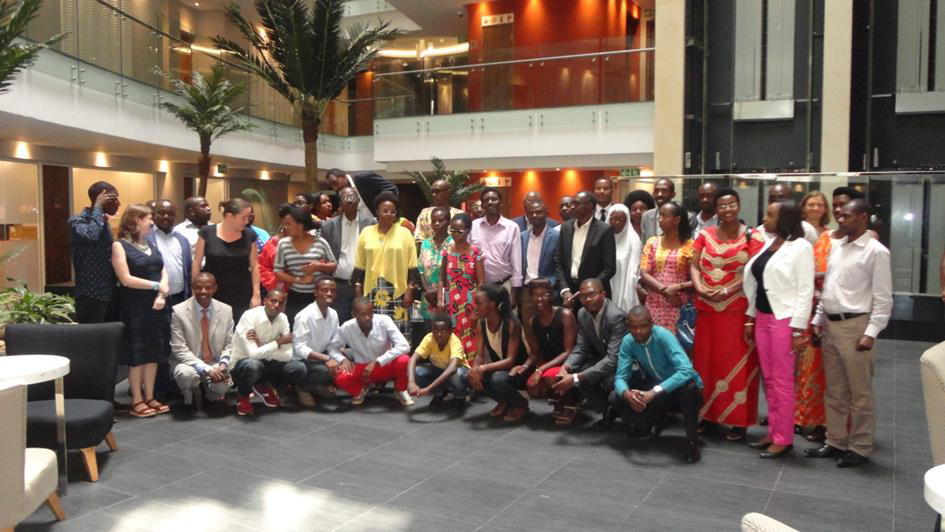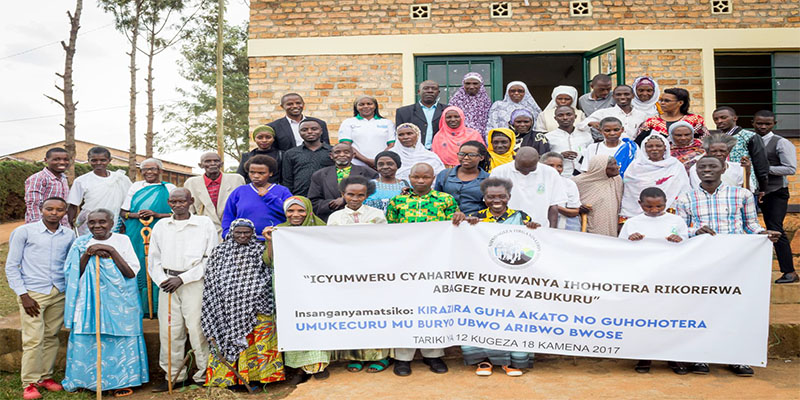Day: January 31, 2018
NSINDAGIZA ORGANIZATION REPORT: July 2016-June 2017

Despite several challenges faced by the organization, a lot has been done during the reporting period. As the main axes of intervention are advocacy and sensitization, most of activities were related to the meetings with Government officials, international and local actors on ageing and the organization of the awareness-raising campaigns on the rights and welfare of older persons as detailed below:
I. ORGANIZATION OF THE LEAVE NO ONE BEHIND NATIONAL DIALOGUE

In collaboration with other civil society organizations working with the most vulnerable people, NSINDAGIZA supported by CIVICUS, organized a leave no one behind (LNB) national dialogue, held in Kigali on the 19th January 2017 at Ubumwe Grande Hotel. The dialogue was attended by 58 participants (29 M and 29 F) representing different Government agencies, Rwandan civil society organizations, academic institutions including university researchers and teachers, church based institutions, International NGOs and the representatives of different categories of people including older persons, widows/widowers, women and girls, persons with disabilities, historically marginalized people, older people in centers, pensioners, people in rural areas, people living with HIV and those with Noncommunicable diseases, youth, etc.
The main objective of the National dialogue was to facilitate and strengthen a platform where policy makers and organizations supporting vulnerable groups can engage in a constructiveway to ensure that ‘Leave no On Behind’ SDGs commitment comes to reality at national and sector planning and review process at all levels.
According to the results from local dialogues conducted in 10 districts by LNB network, the least to have access to the services are; the elderly, historically marginalized people, people with intellectual disability and the poor.
About the top factors causing being left behind, the participants in the local dialogues mentioned economic status, level of education, age, mental health and income generating activities (Pottery).
In all districts, they appreciate that the Government of Rwanda avails the following services to all: Water, education, security, transport and communication, freedom of voting, right to join any organization and medical care. They, however, said that they still face the challenges related to food security, shelter, information, electricity, paid jobs and loneliness for elderly.
Testimonies
Before open discussions, some testimonies were shared by caregivers, people with disabilities, historically marginalized people, etc. Below are some quotes from what they said:
“I thank the organizers of this dialogue who gave me the opportunity to discover my achievements when I lived with my mother-in-law. I am happy that I’m able to share this best practice and I urge the community to increase care to older persons”
Caregiver
“I became blind when I was 36, but now as I speak, I am older, HIV+ and disabled. Thanks to the organization of PWDs living with HIV, I’m confident that I have a role to play in the community, not just begging. I am independent. We don’t need pity, instead we need facilitation”
Older woman with disability and HIV+
As it is not easy to satisfy all the SDGs at the same time, the top 5 SDGs priority goals were identified:
- Goal 1: Eradicate poverty in all its forms everywhere.
- Goal 2: End hunger, achieve food security and improved nutrition and promote sustainable agriculture.
- Goal 3: Ensure healthy lives and promote well-being for all at all ages.
- Goal 4: Ensure inclusive and equitable quality education and promote lifelong learning opportunities for all.
- Goal 5: Ensure availability and sustainable management of water and sanitation for all. After the LNB national dialogue, NSINDAGIZA was one of the 3 selected national organizations among the 30 around the world, and invited to share the best practices in London.
Recommendations:
At the end of the national dialogue, the participants formulated the following recommendations:
- Integrate social inclusion in all the programs developed by both the Government and civil society organizations
- Emphasize on changing the attitudes and behaviors of ensuring the wellbeing of all to ensure leave no one behind.
- Through empowerment ensuring that water and sanitation is accessible to vulnerable people.
- Increasing health friendly services for all, initiate geriatric services in all referral and district hospitals and train health professionals on the basic knowledge in gerontology.
- Free of charge medical treatment for older persons suffering from NCDs and HIV.
- Increase evidence- based advocacy by conducting researches and elderly situational assessment.
- Emphasize on NDI UMUNYARWANDA (I’m Rwandan) program for all.
- Maintain this LNB coalition in order to unite our efforts for effective advocacy.
- Accelerate the National Policy on the rights and welfare of older persons.
- Translate the SDGs into Kinyarwanda and disseminate them to a larger population.
- Train and teach the categories of the most vulnerable about their rights.
- The participants agreed that such dialogues should be organized as frequent as possible in order to share all innovative ideas.
II. Participation to the international dialogue on the precarious and vulnerability of elderly people, Douala, October 2016
The Chairperson of NSINDAGIZA attended the 3 day international colloquium on the precarious and vulnerability of the elderly people held in Douala-Cameroon, on October 2016. This has been an opportunity for our delegate to share with the participants from all over the world, the best practices from Rwanda where elderly people are culturally valued and most of the Government’s programs target older people, such as Mutuelle de sante, VIUP, ubudehe, inkunga y’ingoboka, etc. He was even given the opportunity to speak on national TV and radio as the shared practices were appreciated and should be shared with the wider population.
As the result, NSINDAGIZA in partnership with the International Federation of the Associations of Older Persons, is organizing an international colloquium in July 2018, where the international, regional and national actors on aging will be gathered and discuss on the improvement of the lives of older people.
The main objective of the colloquium is to join efforts for the increased advocacy for the rights and welfare of older persons at national, regional and international level and the theme for the colloquium is “The Role of the family and community on the quality welfare of older persons”.
I. ORGANIZATION OF THE LEAVE NO ONE BEHIND NATIONAL DIALOGUE
Deprecated: preg_replace(): Passing null to parameter #3 ($subject) of type array|string is deprecated in /home2/nsindagi/public_html/wp-includes/kses.php on line 1744
Deprecated: preg_replace(): Passing null to parameter #3 ($subject) of type array|string is deprecated in /home2/nsindagi/public_html/wp-includes/kses.php on line 1744
Deprecated: preg_match(): Passing null to parameter #2 ($subject) of type string is deprecated in /home2/nsindagi/public_html/wp-content/plugins/so-widgets-bundle/base/inc/fields/color.class.php on line 76
Figure 3: Celebration of the IDOP, Nyarugenge and Huye districts, October 2016
One of the key activities of NSINDAGIZA is to organize the international day of older persons (IDOP). On October 1, 2016, NSINDAGIZA worked with the MINALOC to organize the event specifically in the City of Kigali and Huye district and co-facilitated a radio talk with the MINALOC. We appreciate the response of the Government on the advocacy of older persons, to organize the celebration of this day at community level in order to facilitate the participation of older persons and to increase community awareness on the rights and welfare of older persons.
Different methodologies were used, including consciousness-raising which was highly useful as older persons were able to express their feelings and share their experiences openly to their group members, and others were able to give their feedback and solutions were proposed. Surprisingly from what they shared, the family is the most unsafe place for older persons. The following are some of the quotes:
“I felt the threat of ageism when, after having studied at old age, I have been going around seeking for a job but I was told all the time that my age could not allow me to get the job. I started that exercise when I was 50 years old and now I’m 55. They don’t question my competencies, I have all they want but the only barrier is age”.
Older man, Remera Sector
“My granddaughter lives in my house; she decided to become a sex worker and she doesn’t even use condom. She always bring men in my house, gives birth to children that she leaves with me and doesn’t even provide the means to raise them. Sometime back, she took all the documents related to my property and I tried to explain my problem to the local authorities but there was no help from them. All these because I am an older person and she wants me today and leave her freedom to my property”.
Older woman, Remera Sector
Role-play was also used through which older persons shared the challenges of mistreatment by their family members. Though most of them were not comfortable to share but they expressed their feelings of being treated badly by their own families and at workplaces, show how there is no specific measures to their category.
Poems, songs and home visits were also used by older campaigners to express what they feel and visit those who are not able to participate in the campaign. These methods have been effective because older persons were able to express themselves using poems, song and they were able to support others based on what they saw during home visits to those who were not able to attend these events.
Another thing that was effective is the mass media such as radio as it is the most popular way to spread the message to the wider population.
Group discussions on ageing
In order to increase social participation of older persons and decrease isolation and depression, NSINDAGIZA created 6 elderly support groups in 3 districts; Nyarugenge, Huye and Gasabo. Each support group committee received an introductory training on leadership, group dynamic and rights. Currently 5 groups out of the 6 have bank accounts and have initiated savings system and they support each other so that no one is frustrated because of the inequality. Depending on their convenience, some groups meet monthly others meet weekly and across all the groups’ gender is respected. These groups serve as a platform of experience and feeling-sharing and allowing group members to know and support each other in case of bad or good events.
IV. Organization of the health campaign, April 2017

“SOCIAL INCLUSION, RESPONSE TO DEPRESSION”
In Rwanda, more than twenty years after genocide against Tutsi in 1994, the survivors and other people who lost or were separated from their family members, reaching the old age, they are isolated, jobless, poor, weaker, hopeless and neglected. The study conducted in January and February of 2011 in Kigali, revealed that 15.5% of Rwandan population was depressed and no specific actions were taken to face this challenge, especially among older persons. In addition, advancing age is often accompanied by loss of social support systems due to the death of a spouse or siblings, retirement, or relocation of residence. Because of changes in an elderly person’s circumstances and the fact that elderly people are expected to slow down, doctors and family may miss the signs of depression.
As a result, effective treatment often gets delayed, forcing many elderly people unnecessarily struggle with depression. NSINDAGIZA organization promoting the rights and welfare of older persons, in collaboration with health centers, the Saint Vincent of Paul Society, All-Ages Innovation and the Rwandan association of older people, organized the health campaign around the World health day celebrated on April 7 each year. This year, the focus was put on the role of Social inclusion in the fight against depression, and it was organized from April 1-6, 2017. Two objectives of the campaign are summarized in awareness raising for the community and advocacy towards the decision makers for the increase of access to treatments at the primary healthcare level and age friendly health care for older people.
At the end of the campaign, older persons had understood that depression is a treatable disease at hospital and some of them testified that they already have the signs of depression and decided to consult the hospitals for medical treatment. Unfortunately they clearly said that it is unfortunate that one of the major cause of depression is the bad treatment by family members.
“94 years old, lost both parents at young age, removed from school by the adopter, late to have children after marriage, lost my husband and 4 of my children during genocide, rejected by the rest of my children and grandchildren when I reached old age and became disabled. Alone I felt depressed and had always feared that bad people will come to kill me and remove the prosthesis put in my leg. I lived in that situation until I was brought in this home where I feel safer with other people of my age, receiving care from the “Friends of the poor” sisters, but I always think of my family members who rejected me, refused to come to see me when they were called by the home leadership, and I guess that they will probably come to burry my body”.
Older woman with disability in Nzove elderly home.
I. ORGANIZATION OF THE LEAVE NO ONE BEHIND NATIONAL DIALOGUE
Deprecated: preg_replace(): Passing null to parameter #3 ($subject) of type array|string is deprecated in /home2/nsindagi/public_html/wp-includes/kses.php on line 1744
Deprecated: preg_replace(): Passing null to parameter #3 ($subject) of type array|string is deprecated in /home2/nsindagi/public_html/wp-includes/kses.php on line 1744
Deprecated: preg_match(): Passing null to parameter #2 ($subject) of type string is deprecated in /home2/nsindagi/public_html/wp-content/plugins/so-widgets-bundle/base/inc/fields/color.class.php on line 76
Figure 5: World elderly abuse awareness day, Huye June 2017
“BEFORE BEING AN ELDERLY PERSON, I AM A HUMAN BEING”. Elie M/NSINDAGIZA
“Like childhood and disability, the concept of old age is a socially constructed phenomenon— in other words, it is not simply a biological process, but something that is given particular meaning depending upon its social and historical context”.
(Gergen 2001)
According to the RPHC4, there are 511,738 elderly persons (60 and above) living in Rwanda out of a total population of 10,515,973 inhabitants. The elderly thus represent 4.9% of the total resident population. Data from the four Rwandan censuses indicate that the proportion of elderly persons first increased from 4.8% in 1978 to 5% in 1991, dropped again slightly to 4.3% in 2002 and has only minimally increased to 4.9% in 2012.
NSINDAGIZA Organization, having a mission to promote the rights and welfare of elderly people, in collaboration with other local stakeholders working with older persons, organizes every year the community awareness campaigns on the rights of older persons. For this year the focus was put on the “The increase of awareness on the rights of older women to non-discrimination, equality and freedom from violence, abuse and neglect”.
During the awareness campaigns, workshops were organized in Huye, Nyarugenge and Gasabo districts, where older campaigners together with young people met to discuss on the issue of violence, abuse and neglect against older persons. In all the sites, workshops were attended by older persons, youth as well as local authorities. In Huye, NSINDAGIZA club operating in the University of Rwanda (UR), in collaboration with the elderly support groups and Saint Vincent of Paul Society, organized two workshops and the elderly support groups organized workshops in different areas in Remera and Kigali sectors.
Apart from the workshops, the leaders of NSINDAGIZA arranged advocacy meetings with different officials in MINALOC and MIGEPROF, and organized radio talks and other mass media were used to spread widely the message.
VI. Formation of the NSINDAGIZA youth club in Huye and Kigali

As one of the strategies of NSINDAGIZA to promote the rights and welfare of older persons is to build a bridge between older and younger generations, this year 2016-2017, we formed two youth clubs; one in the University of Rwanda, Huye campus another one in Remera Sector-Gasabo District. These clubs elected their committees who received training for better understand the concept of ageing and encourage them to be involved in the promotion of the rights and welfare of older persons.
In Huye, the participants courageously agreed to sustain the group, to be the agents of change in society by organizing the community awareness campaigns to improve the lives of elderly persons and advocate for them. As university students, they decided to use different measures in advocacy including:
VII. Training of elderly support group committees on the health, rights and economic initiatives
Through the 6 elderly support groups (ESG) more than 100 older persons were supported in acquiring medical insurance, food and sanitary materials. We continuously organized trainings for the ESG committees on rights, health and economic initiatives. For the reporting period, the focus was put on the practical approach of the trainings where the committees, on their turn, cascaded the training to the group members and discussed the possible small projects such as livestock in Huye, soap factory in Gasabo, savings in Nyarugenge, etc.

